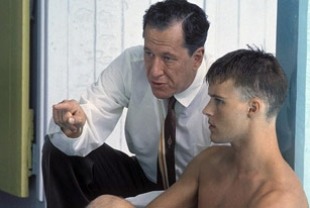"Every man's biography is to be understood in relation to his father," the great literary critic Lionel Trilling once observed. For some, this important figure is a role model and a source of wisdom and insight. But for others, father is a shadow figure in family life, at the periphery, working all the time, and distant in his emotions. And for some unlucky ones, father is a living nightmare, a constant threat to their well-being and self-esteem. The latter figure looms large in this true story of an Australian swimming champion during the 1950s. The film is directed by Russell Mulcahy from a screenplay by Anthony Fingleton based on a book by Anthony Fingleton and Diane Fingleton.
Harold Fingleton (Geoffrey Rush) works on the docks in Brisbane, Australia, during the 1950s and 1960s. He is a violent alcoholic whose terrible childhood has cast a dark shadow over his adulthood. His long-suffering wife Dora (Judy Davis) tries desperately to cope with his depression and irrational mood swings. His four sons and one daughter never know what to expect next from this angry man.
Harold Jr. (Kain O'Keefe as a boy and David Hoflin as a teenager), the oldest boy, constantly picks on Tony (Mitchell Dellevergin, Jesse Spencer) since he plays the piano and is his mother's favorite. Tony is very close to his brother John (Thomas Davidson, Tim Draxl), and they both turn out to be good swimmers. When their father discovers this, he is thrilled and soon becomes a hard taskmaster as their informal coach. Harold even manages to get them into a Catholic school after convincing the priest that they will add prestige by winning medals as champion swimmers.
Most of the drama in this story does not take place at the swimming meets but in the repeated violations of Tony's soul by his cruel father, who seems to take special pleasure in denigrating his athletic achievements or ignoring them completely. Early on Harold chooses John as the winner of the two, and he constantly taunts Tony as being too weak as a "poof" (referring to his piano playing). This strategy pays off by putting the two brothers in competition with each other and dashing the close bond that they shared when they were younger.
In a pivotal scene, Dora tells Tony that he cannot forge his future based on what his father thinks or does to him; he must come up with his own dream and take his best shot at that. It is easy for a child who is singled out for harm to give up and settle for being a victim of injustice. Tony's mother's unstinting love and devotion helps pull him past this pitfall. The surprising choice that Tony makes for his life path is one that stuns Harold and proves the boy's mettle in the face of so much emotional suffering.
Swimming Upstream explores many issues that will resonate with those who were attacked but not broken by difficult fathers.
